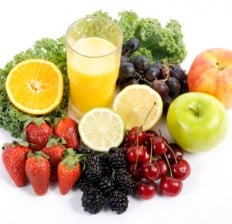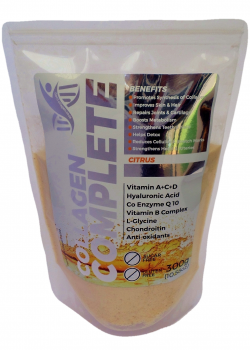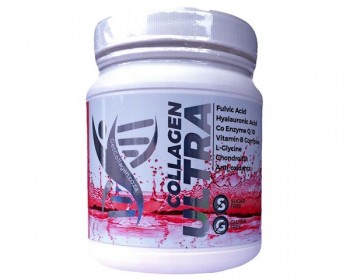Both our Collagen Ultra and Collagen Complete Supplements
Contain Vitamin C!
What are Vitamin C Foods Good For?
Vitamin C is a water-soluble vitamin that plays a role in maintaining the health of the body’s connective tissue as well as acting as an antioxidant. Your body needs to ingest vitamin C, vitamin C foods, on a daily basis in order to maintain necessary supplies.
Your body does not make vitamin C on its own, and it does not store it either, so it is important that you include plenty of fruits and veggies that contain vitamin C in your daily diet. The benefits of vitamin C may include protection against immune system deficiencies, cardiovascular disease, prenatal health problems, eye disease, and even skin wrinkling.
Over 100 studies about vitamin C have been conducted over the last 10 years, all revealing an ever-growing list of vitamin C benefits. Because Vitamin C is not a vitamin that your body produces, it is very common to have a Vitamin C Deficiency.
Vitamin C Deficiency Symptoms
A deficiency in vitamin C shows itself in several common ways in the body. While the signs and symptoms of Vitamin C deficiency are not too

bothersome, the results of long-term low levels of vitamin C are very detrimental and worth making a priority. A severe vitamin C deficiency will result in scurvy, a disease resulting from the breakdown of collagen.
Scurvy will make you feel fatigued and lethargic. It affects bone and muscle strength and it stifles the immune system. Scurvy is rarely seen today, as only a very small amount of vitamin C is needed to prevent it.
Citrus was actually used in the 18th century in order to cure the two million sailors that were suffering from Scurvy. It is important to understand, however, that less noticeable signs of Vitamin C are still very serious such as:
- Easy bruising
- Swollen gums
- Bleeding gums
- Slow wound healing
- Gingivitis (inflammation of the gums)
- Dry and splitting hair
- Dry red spots on the skin
- Rough, dry, scaly skin
- Nosebleeds
- Weakened immune system
- Digestive disorders like leaky gut and autoimmune disease
- Possible weight gain because of slowed metabolism
- Swollen and painful joints
Health problems related to a vitamin C deficiency can get much worse over time, and may lead to some serious health issues. Long Term Problems from Low Levels of Vitamin C include:
- High blood pressure
- Gallbladder disease
- Stroke
- Certain cancers
- Atherosclerosis
To get the most nutrition and Vitamin C from your fruits and veggies, there are a few easy tips to follow: eat real foods that are uncooked and raw, make an effort to eat your fruits and vegetables soon after cutting them up, and steam fruits and veggies, instead of boiling them. As I always say, eating organic, raw fresh foods is your best possible source of nutrition.
Food in its natural state will provide your body with the most abundant source of nutrition, so even though many people choose to turn to supplements when looking to get more vitamins into their bodies, I want to emphasize that the best source of any vitamin, mineral, or nutrient is fresh, raw food sources.
Top Food Sources of Vitamin C:
Try to consume 2-3 of these vitamin C foods sources daily; this will help you maintain optimal levels of vitamin C. Many of these foods are included in my recommended healing diet due to their high antioxidant content and numerous health benefits.
1) Guava
1 fruit: 377 mg (over 628% DV)
2) Black Currant
1 cup: 203 mg (over 338% DV)
3) Red pepper
1 cup raw: 190 mg (over 317% DV)
4) Kiwi
1 piece: 164 mg (273% DV)
5) Green peppers
1 cup chopped, raw: 120 mg (200% DV)
6) Orange
1 large: 82 mg (over 163% DV)
7) Strawberries
1 cup: 89.4 mg (149% DV)
8) Papaya
1 cup, in pieces: 86.5 mg (over 144% DV)
9) Broccoli
1 cup raw: 81.2 mg (135% DV)
10) Kale
1 cup raw: 80 mg (134% DV)
11) Parsley
1 cup, fresh: 79.8 mg (over 133%)
12) Pineapple
1 cup, fresh: 78.9 mg (over 131%)
13) Brussels sprouts
1 cup raw: 74.8 mg (125% DV)
14) Grapefruit
1 cup: 71.8 mg (120% DV)
15) Peas
1 cup raw: 58 mg (97% DV)
16) Cauliflower
1 cup raw, chopped: 46.4 mg (over 77% DV)
17) Mango
1 cup: 45.7 mg (76% DV)
9 Health Benefits of Vitamin C
1. Promotes Healthy Skin and Collagen Formation
A major study that involved over 4,000 women aged 40-74 found that higher vitamin C intakes can lower the likelihood of a wrinkled appearance, dryness of the skin, and can help to naturally slow aging.(1) Vitamin C is used to form an important protein used to make skin, tendons, ligaments, and blood vessels. It helps to heal your wound and it form scar tissue.
There is even some evidence that using vitamin C skin cream can decrease the amount and duration of skin redness following cosmetic skin procedures like wrinkle or scar removal. Maintaining healthy skin through a diet high in antioxidants is one important way to prevent skin cancer.
2. Improves Mineral Absorption
For your body to receive the nutrients it needs to function properly, your digestive system must first take these nutrients from the food that you eat, or the supplements that you take, and then absorb them into your bloodstream.
Then your cells absorb these vitamins and nutrients and they help your body to in turn reduce inflammation and the development of disease. Taking vitamin C along with iron can increase how much iron the body absorbs in adults and children.
3. Lowers Risk of Gout
Vitamin C is associated with lowering the risk of gout, which is Gout is a painful, arthritis type condition mainly afflicting the big toe. The big toe becomes stiff, inflamed and painful as a result of excess uric acid leading to crystals formed in joints.
In a long-term study of males over the age of 40, who took between 1,000 and 1,499 mg of vitamin C per day, their risk of gout was reduced by 31%. Participants who took over 1,500 mg of vitamin C per day have almost half the risk of getting gout. This is compared to those who did not take supplements.
4. Fights Free Radical Damage
Vitamin C is one of many antioxidants that can protect against damage caused by harmful molecules called free radicals, as well as toxic chemicals and pollutants like cigarette smoke.
Free radicals can build up in the body and contribute to the development of health conditions such as cancer, heart disease, and arthritis. Free radicals are made when your body breaks down food or when you are exposed to smoke, tobacco, or radiation.
 5. Fights off Colds and Flu
5. Fights off Colds and Flu
It has long been understood that vitamin C benefits your immune system and plays a large role in your body’s ability to fight off colds and viruses. You can take 1000 mg of Vitamin C to fight off an oncoming cold and 4000 mg per day to get rid of a cold that is already in your system.
There is also good evidence that taking vitamin C for colds and flu can reduce the risk of developing further complications, like pneumonia and lung infections.
6. Improves Stressed Immune System
A recent analysis showed that vitamin C is beneficial to individuals whose immune system has been weakened due to stress. Considering that stress has become a common condition in our society, a sufficient intake of vitamin C can serve as an ideal tool for one’s overall health.
7. Helps Cancer Treatment
A high dose of vitamin C can enhance the cancer-fighting effect of drugs used in chemotherapy. Vitamin C has also been found to target only the cells that are in need of these nutriments, unlike other drugs that can harm normal cells as well. Researchers believe that vitamin C can be a safe and cost-effective cancer remedy and treatment for ovarian and lung cancer as well.

8. Lowers Risk of Stroke
One study in the American Journal of Clinical Nutrition found that people with the highest concentrations of vitamin C in their blood had a 42% lower stroke risk than those with the lowest concentrations. Because people who eat fruits and veggies have higher blood levels of vitamin C, strive to increase the amount of fruits and veggies that you consume in one day.
9. Improves Physical Performance
Eating more vitamin C as part of your diet might improve your physical performance and muscle strength; this is especially true in older people. Taking vitamin C supplements can improve your oxygen intake during exercises and some studies have shown that it can reduce your blood pressure.
Using vitamin C before heavy physical exercise, such as a marathon, might prevent upper respiratory infections that sometimes follow exercise of this kind. Vitamin C can also improve the function of your lungs and airways.
It has been found that vitamin C doses of 1,000 to 2,000 mg per day may reduce the production of histamines, which contributes to inflammation in asthmatic people, and can therefore help to improve asthma symptoms.
Recommended Daily Intake of Vitamin C
As I’ve said, the best source for vitamin C is from fruits and vegetables that are grown locally and organically. If you must supplement, be certain that the supplements you choose are high quality, bioavailable, and free of additives, fillers, and other synthetic ingredients that will harm you in the long run.
Keep in mind that some cereals and other food beverages are fortified with vitamin C, which means that a vitamin or mineral has been added into the food. Make sure you check the product labels to see just how much vitamin C is in the product. Cooking vitamin C foods, like broccoli or peppers, can reduce the vitamin C content; storing these foods, microwaving and steaming them may also cause a reduction of vitamin C levels.
The best sources of vitamin C are uncooked or raw fruits and vegetables.
The Recommended Dietary Allowance (or RDA) for vitamins reflects how much of each vitamin most people should get each day. The RDA for vitamin C (measured in milligrams per day) is as follows:
For infants:
- 0 – 6 months: 40 mg/day
- 7 – 12 months: 50 mg/day
For children:
- 1 – 3 years: 15 mg/day
- 4 – 8 years: 25 mg/day
- 9-13 years: 45 mg/day
For adolescents:
- Girls 14 – 18 years: 65 mg/day
- Pregnant teens: 80 mg/day
- Breastfeeding teens: 115 mg/day
- Boys 14 – 18 years: 75 mg/day
For adults:
- Men age 19 and older: 90 mg/day
- Women age 19 years and older: 75 mg/day
- Pregnant women: 85 mg/day
- Breastfeeding women: 120 mg/day
- Smokers, or those who are exposed to secondhand smoke, should increase their daily amount of vitamin C by 35 mg/day
Vitamin C Side Effects
Vitamin C is not stored in the body (excess amounts are excreted), so overdose is not a concern. Your body will get rid of excess vitamin C in your urine, it’s actually very smart about what it needs and doesn’t need. It is still important not to exceed the safe upper limit of 2,000 milligrams a day to avoid stomach upset and diarrhea. A recent study found a link between taking vitamin C supplements and kidney stones.
The study found that men who take vitamin C supplements are twice as likely to develop kidney stones as men who don’t take any dietary supplements. These results do not apply to men who get their vitamin C from eating fruits and vegetables, and women were not studied.(2)
Vitamin C Interactions
Water-soluble vitamins must be continuously supplied in the diet to maintain healthy levels. Eat vitamin-C-rich fruits and vegetables raw, or cook them with minimal water so you don’t lose some of the water-soluble vitamin in the cooking water.
Aluminum interacts with vitamin C because vitamin C can increase how much aluminum the body absorbs, so take vitamin C two hours before or four hours after you have any antacids. Vitamin C might decrease how quickly the body gets rid of estrogens. Taking vitamin C along with estrogens might increase the effects and side effects of estrogens.
Because vitamin C is an antioxidant, there are some concerns that it may decrease the effectiveness of some medications used for cancer. Taking large doses of vitamin C may also reduce how much of some medications used for HIV/AIDS stays in the body.
This includes medications such as Agenerase, Viracept, Norvir, and Fortovase. Large amounts of vitamin C may decrease the effectiveness of warfarin (Coumadin) because it is used to slow blood clotting.
Re-Discover Vitamin C’s Amazing Health Benefits
Vitamin C (ascorbic acid) is a water soluble vitamin. That is, your body needs to ingest vitamin C or foods with vitamin C on a daily basis in order to maintain necessary supplies because Vitamin C is excreted daily.
Vitamin C Benefits
- Repair and maintain teeth and bones
- Slow and prevent cell damage
- Maintain healthy body tissues
- Boosts immune system
- Helps absorb iron from plant foods
- Decreases severity and duration of colds
- Fights free radical damage
- Builds collagen needed to bind bones, joints, tendons, and ligaments together
- Builds and maintains blood vessels
A deficiency in vitamin C shows itself in several common ways in the body. While the deficiencies signs are not too bothersome, the results of long term low levels of vitamin C are something to worry about now.
Vitamin C and the Common Cold
It has long been understood that vitamin C benefits your immune system and plays a large role in your body’s ability to fight off colds and viruses. You can take 1000 mg of Vitamin C to fight off an oncoming cold and 4000 mg per day to get rid of a cold already in your system.
Signs of Vitamin C Deficiency
- Easy bruising
- Swollen gums
- Bleeding gums
- Slow wound healing
- Gingivitis
- Dry and splitting hair
- Rough, dry, scaly skin
- Nosebleeds
- Weakened immune system
Severe vitamin C deficiencies result in scurvy. Scurvy was the main cause of sailors’ deaths years ago with teeth falling out, spots on skin, and mucus membranes bleeding into the skin. Not an easy way to go.
Long Term Problems from Low Levels of Vitamin C
However, when it comes to long term vitamin C deficiencies the problems get much worse.
- High blood pressure
- Gallbladder disease
- Stroke
- Certain cancers
- Atherosclerosis
If you don’t want to fall victim to these and other serious health issues it’s imperative that you eat foods rich in crucial vitamin C.
The Best Food Sources of Vitamin C
While many people turn to supplements I want to emphasize that the best source of any vitamin, mineral, or nutrient is fresh, raw food sources.
It’s important to realize that any food is its natural state will provide your body with the most abundant source of nutrition that’s perfectly packaged. Therefore use the following list as a guide for how you consume these vitamin C rich foods.
3 Ways to Get the Most Nutrition from Your Fruits and Veggies
- Eat real foods that are uncooked and raw.
- Make an effort to cut up your fruits and vegetables as close to eating them as possible.
- Steam fruits and veggies, instead of boiling.
As I always say, eating organic, raw fresh foods is your best possible source of nutrition.
By now you’re probably wondering how much is enough vitamin C.
Daily Minimum Dosages of Vitamin C
According to the United States Department of Agriculture (USDA) adults and children should get a certain amount of vitamin C everyday. See the following chart for USDA recommendations:
As I’ve said, the best source for vitamin C is from fruits and vegetables that are grown locally and organically. If you must supplement be certain that the supplements you choose are high quality, bio-available, and free of additives, fillers, and other synthetic ingredients that will harm you in the long run.
When you eat a diet full of a variety of fresh, raw foods you’ll know you’re getting all the nutrients your body really needs.
References:
- http://edis.ifas.ufl.edu/pdffiles/fy/fy21500.pdf
- http://iom.edu/Activities/Nutrition/SummaryDRIs/~/media/Files/Activity%20Files/Nutrition/DRIs/RDA%20and%20AIs_Vitamin%20and%20Elements.pdf
- http://www.umm.edu/altmed/articles/vitamin-c-000339.htm
- http://reedir.arsnet.usda.gov/codesearchwebapp/(qjjdvr45b410vf55afvmzy55)/codesearch.aspx


